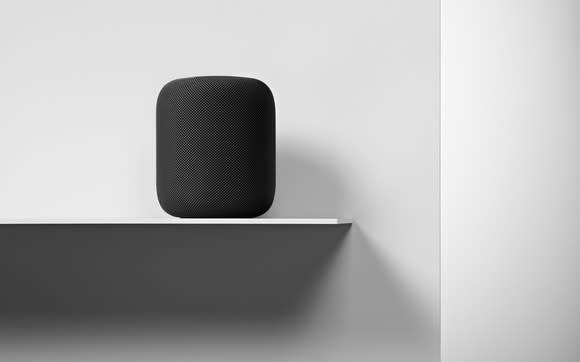Apple Needs More Than HomePod to Play in Smart Home
When Apple (NASDAQ: AAPL) announced in 2014 that it was creating the HomeKit for iOS devices, I thought it would give the company a lead in the smart home. Smart devices like thermostats were already becoming popular, and more devices were likely to hit the market.
But the Home app didn't make an appearance until 2016, and today, it's still difficult to build a smart home, even if you use only HomeKit compatible products. Meanwhile, Amazon's (NASDAQ: AMZN) Alexa has become a popular smart home hub, offering an ever-expanding number of commands that allow it to connect to Amazon as well as third-party apps. Apple hasn't lost the battle for the home, but it will need to shift into high gear if it's going to have a chance against Amazon.

Image source: Apple.
Why Amazon is eating Apple's lunch
The reason Amazon has become a platform of choice is because it made its Echo and Echo Dot speakers cheap and easy to use for consumers, and easy for developers to connect and build compatibility with Alexa into their new products. It's like a virtual foundation at the center of the smart home, and companies are building capabilities on top of it, making Alexa and the Echoes better along the way.
Apple took a different approach, closing the HomeKit and Siri smart home controls off from the world. In the past, the company has had some success in controlling its technology, and ensuring that the interface people interact with is up to Apple's standards, but in this case, the strategy has limited the capabilities of both HomeKit and Siri in the smart home.
It's become clear that the open platform Amazon has built will grow in scale much faster than Apple's HomeKit. But that doesn't necessarily mean Apple is going to be left in the dust.
How Apple can play in the smart home
Apple's brilliance in tech has always been about taking the complicated and making it simple. It could do the same thing for the smart home with a little effort.
The company already intends for an iPhone or iPad to be the brains behind a HomeKit powered smart home -- what's needed now are the compatible accessories. HomePod is a piece of that puzzle -- a speaker and a voice-activated unit like the original Alexa speakers. But connecting devices like lights, thermostats, security cameras and sensors, garage doors, and lights to it is far from easy. In other words, setting up HomeKit isn't exactly an "Apple-like" experience. And that's where the opportunity is.
If Apple made buying, installing, and using smart home devices simple in the way that it has done with other technologies, it could command a decent share of the premium smart home market. It doesn't need to make everything for everyone, but start with locks, lights, and a thermostat, and you have the start of a potentially lucrative business.
Apple could have a sizable home market
The opportunity in the smart home will pale in comparison to the value of its iPhone segment, but these aren't the kind of products Apple should invest in because it's going to dominate the market. It should invest in them because doing so locks key customers into the Apple ecosystem, and increases revenue per customer by a sizable amount.
Let's say, for example, that Apple makes a smart thermostat ($200), a smart dimmable light ($30 each), and a smart door lock ($150) and sells 1, 10, and 2 units respectively to a "power user." The revenue impact would be $800 from each such customer. If just 1% of Apple's estimated 700 million users buy $800 worth of home items and another 1% spends $400 on them, the revenue impact would be $8.4 billion. That would be similar to the revenues generated by the Apple Watch -- another product that locks customers into the company's ecosystem.
Apple could build a large niche in the smart home business with the right strategy -- but part of that strategy demands it make the smart home as user-friendly as the rest of its products. Until it does, Amazon will continue to be the smart home platform of choice, even for iPhone users.
More From The Motley Fool
John Mackey, CEO of Whole Foods Market, an Amazon subsidiary, is a member of The Motley Fool's board of directors. Travis Hoium owns shares of Apple. The Motley Fool owns shares of and recommends Amazon and Apple. The Motley Fool has the following options: long January 2020 $150 calls on Apple and short January 2020 $155 calls on Apple. The Motley Fool has a disclosure policy.
